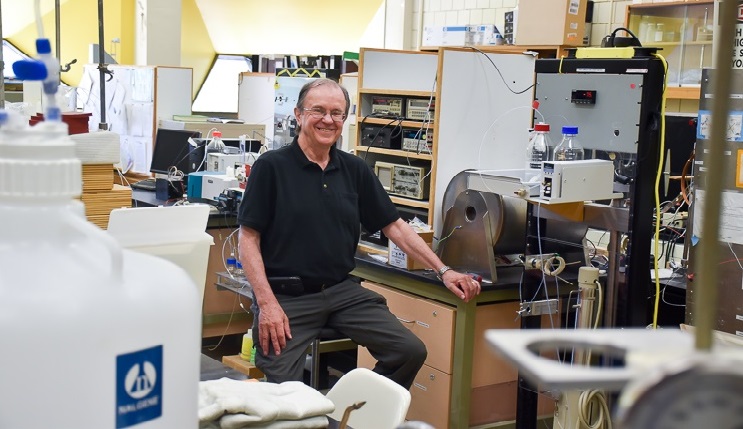
A University of Guelph chemistry professor has received a prestigious multimillion-dollar federal research chair.
Prof. Peter Tremaine has been named the NSERC/UNENE (University Network of Excellence in Nuclear Engineering) Senior Industrial Research Chair in High-Temperature Aqueous Chemistry.
Among the Natural Sciences and Engineering Research Council of Canada’s (NSERC) most esteemed grants, Industrial Research Chair Grants are awarded to researchers considered international leaders and exceptional among their peers.
The chair is worth nearly $2.5 million over five years, with $930,000 coming from NSERC and more than $1 million from industry. The University and other government agencies will contribute the remaining funds.
The announcement was made today by Lloyd Longfield, MP for Guelph, at the University.
“Our government is proud to support the important work of talented researchers like Professor Tremaine, who is collaborating with industrial partners to modernize our nuclear energy industry and address issues like global warming,” Longfield said.
“Through programs like NSERC’s Industrial Research Chairs, we are bridging the gap between discovery-driven research and applied research in order to address the important challenges that are important to Canadians.”
Tremaine hopes his research will help extend the lifetimes of Canada’s current heavy-water nuclear reactors, lower reactor radiation fields and improve long-term storage of spent fuel. He expects related research will also help in designing next-generation reactors.
“Investing in high-impact research and development helps tackle issues of global importance, including clean energy,” said Mario Pinto, NSERC president.
“Dr. Tremaine’s Industrial Research Chair will contribute to a sustainable future and help Canada meet its targets for mission innovation. Students and future chemists will also have the opportunity to contribute to a world-class university-industry partnership that will drive Canada’s global leadership position in CANDU R&D.”
Malcolm Campbell, U of G’s vice-president (research), added: “This is an incredible honour for Professor Tremaine and his research team, and for the entire University.”
Calling Tremaine one of the world’s foremost authorities on water chemistry in nuclear reactors, Campbell said the new chair “will allow him to expand his work, which is critical to addressing global environmental and energy issues. It also enhances Guelph’s research strength and reputation in this important field.”
Tremaine, formerly dean of the College of Physical and Engineering Science, has spent more than 30 years studying high-temperature, high-pressure water chemistry found in nuclear reactors, thermal power stations and geothermal systems.
New reactor designs are expected to operate at even higher temperatures and pressures in order to improve efficiency, sustainability and safety.
Tremaine’s research has focused on nuclear power applications, especially the chemistry of Canada’s CANDU heavy water nuclear reactors. Most CANDU reactors were built in the 1970s and ‘80s and were designed to last about 30 years. They use heavy water to transfer heat from the reactor core to a steam generator.
His work bridges pure research and practical applications.
“High-temperature water chemistry is a frontier area of research, with the potential to discover unusual species and novel effects that are not seen under everyday conditions,” Tremaine said.
“The excitement of the research comes from tackling challenges and questions that benefit Canadians, while contributing in-depth understanding to an important area of basic research.”
Expertise and equipment in Tremaine’s research lab make it one of only a few worldwide able to study water chemistry under such extremes of heat and pressure.
The new NSERC chair will create a centre of excellence at Guelph, allowing students and other researchers to work with nuclear industry partners across Canada, Tremaine said.
“It will also contribute to Guelph’s role as a leader in developing sustainable, low-carbon energy alternatives to address global warming.”
Prof. Paul Rowntree, chair of the Department of Chemistry, said Tremaine’s new chair “speaks of Peter’s research excellence, the quality of his research group and the skill with which they integrate fundamental lab science with the pressing needs of the Canadian nuclear industry.”
Industrial partners involved in this NSERC chair are UNENE, the CANDU Owners Group, the Nuclear Waste Management Organization and the Electric Power Research Institute.